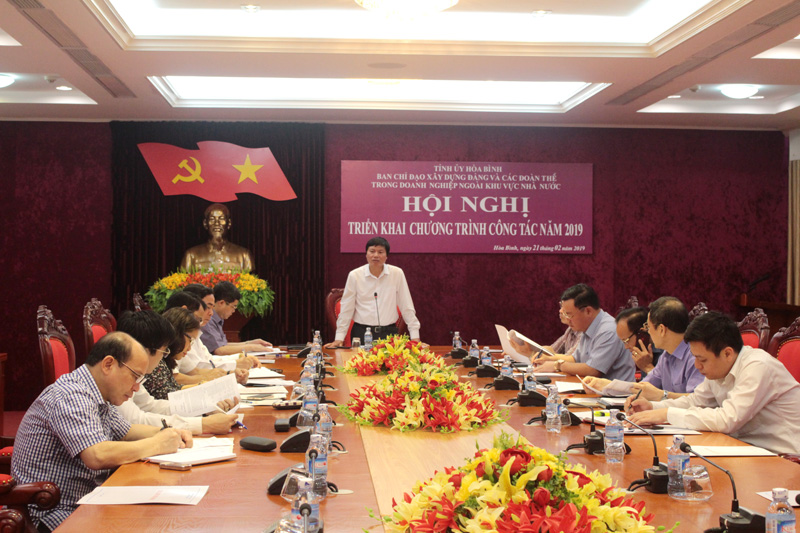
(HBO) – The Hoa Binh steering board for the building of Party units and unions in non-State businesses held a meeting on February 21 to review its performance in 2018 and launch tasks for this year. Permanent Vice Secretary of the provincial Party Committee and Chairman of the provincial People’s Council Tran Dang Ninh, who is also head of the steering board, chaired the event.
Permanent
Vice Secretary of the provincial Party Committee and Chairman of the provincial
People’s Council Tran Dang Ninh addresses the meeting.
From November 2017 to October 2018, 22 people
were admitted to the Party and two Party cells were established in businesses.
That raised the number of non-State firms with Party units to 51 with 662 Party
members, including five grassroots Party organisations, 30 grassroots Party
cells, and 16 Party cells under communal-level Party organisations.
While 28 new grassroots trade unions with 3,897
members were set up, four grassroots units of the Ho Chi Minh Communist Youth
Union (HCYU) with 82 members came into being. At present, there are 202
grassroots trade unions with 22,035 members and 21 HCYU units with 917 members
in non-State businesses across Hoa Binh province.
Two Women’s Union branches with 111 members in
private companies and cooperatives have also maintained their activities.
Addressing the meeting, Tran Dang Ninh,
Permanent Vice Secretary of the provincial Party Committee, Chairman of the
provincial People’s Council and head of the steering board, recognised the
results of the steering board and its member sectors’ activities in 2018.
He asked the member sectors, basing on their
assigned tasks, to actively direct subordinate agencies and units to have a
good grasp of the local situation; step up the monitoring and promotion of the Directive
No. 38 implementation; and conduct communications, guide the establishment of
and organise activities of Party units and unions appropriate to each
business’s conditions.
To the firms already having Party units and other unions, it is necessary to
help training persons in charge of Party and union-related work and reform
their activities.
The official assigned the Organisation Board of
the provincial Party Committee to coordinate with relevant agencies in proposing
rewards for collectives and individuals with outstanding accomplishments in the
building of the Party and unions in enterprises./.
Hoa Binh province is undergoing a dynamic transformation amid Vietnam’s national digital transition. Building on Poliburo’s Resolution No. 57-NQ/TW on breakthroughs in science, technology, innovation, and national digital transformation, the province has rolled out a wide range of practical action plans. A standout initiative is the "Digital Literacy for All” movement, an effort to ensure that no one is left behind in the digital era.
Hoa Binh province is undergoing a dynamic transformation in the wake of the national digital transformation movement. Building on Resolution No. 57-NQ/TW of the Politburo on breakthroughs in science, technology, innovation, and national digital transformation, the province has implemented a wide range of practical action plans. A standout initiative is the "Digital Literacy for All” movement ambitious effort to ensure that no one is left behind in the digital age.
With a spirit of unity and proactive problem-solving, the Party Committee, the government and the people of Dong Lai Commune (Tan Lac District) have made great strides in implementing the resolutions of the 24th Party Congress of the commune for the 2020 - 2025 term. Focusing on leadership and practical actions, the commune has brought the Party’s resolutions into daily life, creating strong impacts and pushing the local development forward.
Amid the nationwide push for digital transformation, young people in Hoa Binh Province are stepping up as dynamic pioneers, applying technology to enhance Youth Union operations and expand the reach of youth-led initiatives. Through creativity and adaptability, Youth Union organizations at all levels have introduced a series of practical solutions, contributing to modern governance and community development.
In recent years, An Nghia commune, located in Lac Son district, has stepped up administrative reform, focusing on improving the quality and efficiency of its single-window service unit for receiving and processing administrative procedures. These improvements have helped create favourable conditions for local residents and organisations to handle administrative procedures, contributing to the commune’s broader socio-economic development.
The Prime Minister-approved master plan to develop the multi-use value of forests ecosystems through 2030, with a vision to 2050, aims to improve the management and sustainable use of forest resources, create jobs, increase incomes, and improve the living standards of ethnic minorities, people in mountainous and remote areas, forest workers and those living near forests.



